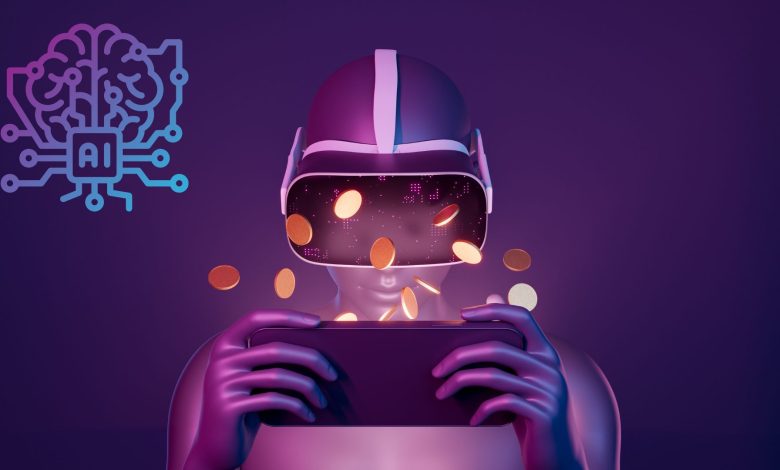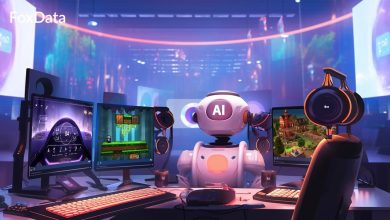Harnessing the Power of Artificial Intelligence (AI) in Gaming: Shaping the Future of Interactive Entertainment
Shaping the Future of Interactive Entertainment

Introduction:
Artificial Intelligence (AI) has become an integral part of the gaming industry, revolutionizing game development, player experiences, and the way games are designed, played, and enjoyed. From intelligent NPCs and dynamic game worlds to adaptive difficulty levels and personalized experiences, AI technologies are transforming gaming into a more immersive, engaging, and interactive medium. This article explores the impact of AI in gaming, its applications, advancements, and the future possibilities it holds for interactive entertainment.
The Evolution of AI in Gaming:
AI has been a fundamental component of gaming since its inception, with early games featuring simple rule-based systems and scripted behaviors for non-player characters (NPCs). However, advancements in AI technologies have enabled developers to create more sophisticated and intelligent NPCs that can adapt to player actions, learn from their experiences, and interact with the game world in more dynamic and lifelike ways. From strategic decision-making in strategy games to realistic behaviors in open-world adventures, AI has enhanced the depth, complexity, and immersion of gaming experiences across genres.
Applications of AI in Gaming:
AI technologies are used in gaming for a wide range of applications, including:
Intelligent NPCs:
AI-driven NPCs can simulate realistic behaviors, emotions, and interactions, enhancing the believability and immersion of gaming experiences. NPCs in modern games can exhibit complex behaviors such as pathfinding, decision-making, and social interactions, making them more dynamic and responsive to player actions.
Procedural Content Generation:
AI algorithms can generate vast, procedurally generated worlds, levels, and environments, offering endless opportunities for exploration, discovery, and emergent gameplay. Procedural content generation allows developers to create rich, diverse game worlds with minimal manual effort, increasing replayability and player engagement.
Adaptive Difficulty:
AI can dynamically adjust the difficulty level of games based on player skill, performance, and preferences. Adaptive difficulty systems use player telemetry data and machine learning algorithms to analyze gameplay patterns and adjust game mechanics, enemy behavior, and level design in real-time, ensuring a challenging yet enjoyable experience for players of all skill levels.
Personalized Experiences:
AI-driven recommendation systems can analyze player preferences, playstyles, and behavior data to personalize gaming experiences and content recommendations. By understanding player preferences and habits, AI can deliver tailored content, challenges, and rewards that resonate with individual players, increasing engagement and retention.
Advancements in AI Technology:
Recent advancements in AI technology have further enhanced its capabilities and applications in gaming:
Machine Learning and Neural Networks:
Machine learning algorithms and neural networks enable AI systems to learn from data, adapt to new situations, and improve over time. Game developers use machine learning techniques to train AI models for tasks such as character animation, natural language processing, and player behavior prediction.
Reinforcement Learning:
Reinforcement learning algorithms enable AI agents to learn optimal strategies and behaviors through trial and error. In gaming, reinforcement learning is used to train AI-controlled characters, optimize game mechanics, and develop adaptive difficulty systems that respond to player actions and performance.
Natural Language Processing (NLP):
NLP technologies enable AI-driven NPCs to understand and respond to player commands, queries, and conversations in natural language. NLP-powered chatbots and virtual assistants enhance player immersion and engagement by providing realistic, interactive dialogue and conversation experiences.
Generative Adversarial Networks (GANs):
GANs are a type of AI architecture that generates realistic, high-quality content, such as images, audio, and text. In gaming, GANs can be used to create lifelike character models, environments, and assets, reducing development time and costs while increasing visual fidelity and realism.
Future Possibilities:
The future of AI in gaming holds limitless possibilities, with advancements in technology paving the way for even more immersive, intelligent, and interactive experiences. As AI continues to evolve, we can expect to see:
More Lifelike NPCs:
AI-driven NPCs will become even more lifelike, with advanced behaviors, emotions, and personalities that make them indistinguishable from human players.
Dynamic Game Worlds:
AI algorithms will generate dynamic, procedurally generated game worlds that evolve and adapt in response to player actions, creating endless opportunities for exploration, discovery, and emergent gameplay.
Personalized Storytelling:
AI-driven narrative systems will create personalized storylines, quests, and characters tailored to each player’s preferences, choices, and actions, offering unique storytelling experiences for every player.
Enhanced Player Interaction:
AI-powered chatbots, virtual assistants, and voice-controlled interfaces will enable more natural and intuitive player interactions, enhancing immersion, engagement, and accessibility in gaming.
Conclusion:
Artificial Intelligence (AI) is transforming the gaming industry, enabling developers to create more immersive, intelligent, and interactive experiences for players. From intelligent NPCs and dynamic game worlds to adaptive difficulty systems and personalized storytelling, AI technologies are reshaping the way games are designed, played, and enjoyed. As AI continues to evolve and advance, we can expect to see even more groundbreaking innovations that push the boundaries of interactive entertainment and redefine the future of gaming.
The Evolution of Artificial Intelligence (AI) in Gaming: From Scripted Behaviors to Intelligent Worlds
Introduction:
Artificial Intelligence (AI) has played a significant role in the gaming industry since its inception, evolving from simple rule-based systems and scripted behaviors to sophisticated algorithms that power dynamic, intelligent game worlds. This article explores the evolution of AI in gaming, tracing its development from early implementations to its current state and future possibilities.
Early Days: Scripted Behaviors and Rule-Based Systems
In the early days of gaming, AI was primarily used to control non-player characters (NPCs) and simulate basic behaviors such as movement, combat, and decision-making. NPCs in classic arcade games like Pac-Man and Space Invaders followed predefined paths and behaviors, with little variation or adaptability. These early implementations relied on rule-based systems and handcrafted scripts to dictate NPC behavior, limiting their complexity and realism.
Advancements in the 1990s: Emergence of Intelligent NPCs
The 1990s saw significant advancements in AI technology, leading to the emergence of more intelligent NPCs with enhanced behaviors and capabilities. Games like Doom and Quake introduced AI-controlled enemies that could navigate complex environments, coordinate attacks, and react to player movements in real-time. These NPCs utilized basic pathfinding algorithms and decision trees to simulate human-like behaviors, enhancing the challenge and immersion of gaming experiences.
Rise of Adaptive AI: Dynamic Difficulty and Learning Algorithms
As gaming hardware and computing power advanced, developers began experimenting with adaptive AI systems that could adjust the difficulty level of games based on player skill and performance. Games like Left 4 Dead and F.E.A.R. implemented dynamic difficulty systems that used player telemetry data to adjust enemy behavior, spawn rates, and environmental variables in real-time, ensuring a challenging yet fair experience for players of all skill levels. Additionally, machine learning algorithms and neural networks were used to train AI models for tasks such as character animation, speech recognition, and player behavior prediction, enabling more sophisticated and adaptive AI behaviors.
Open Worlds and Emergent Gameplay: Procedural Content Generation
The advent of open-world games like Grand Theft Auto and The Elder Scrolls introduced players to vast, expansive game worlds filled with dynamic events, emergent gameplay, and interactive NPCs. Procedural content generation algorithms were used to create lifelike environments, populate them with NPCs, and generate quests, missions, and encounters on the fly, offering endless opportunities for exploration, discovery, and emergent storytelling. Games like Minecraft and No Man’s Sky pushed the boundaries of procedural generation, creating infinitely explorable worlds with unique landscapes, creatures, and ecosystems.
Modern AI: Realistic Behaviors and Deep Learning
In recent years, AI in gaming has reached new heights of sophistication, with developers leveraging advanced algorithms and deep learning techniques to create more realistic and intelligent behaviors. Games like Red Dead Redemption 2 and The Last of Us Part II feature NPCs with lifelike behaviors, emotions, and personalities that react to the player’s actions and the game world in dynamic and unpredictable ways. Machine learning algorithms are used to train AI models on vast amounts of gameplay data, enabling NPCs to learn from their experiences, adapt to changing situations, and develop unique personalities and playstyles.
Future Directions: AI and the Metaverse
Looking ahead, the future of AI in gaming holds limitless possibilities, with advancements in technology paving the way for even more immersive, intelligent, and interactive experiences. As AI continues to evolve, we can expect to see:
More Lifelike NPCs:
AI-driven NPCs will become even more lifelike, with advanced behaviors, emotions, and personalities that make them indistinguishable from human players.
Dynamic Game Worlds:
AI algorithms will generate dynamic, procedurally generated game worlds that evolve and adapt in response to player actions, creating endless opportunities for exploration, discovery, and emergent gameplay.
Personalized Storytelling:
AI-driven narrative systems will create personalized storylines, quests, and characters tailored to each player’s preferences, choices, and actions, offering unique storytelling experiences for every player.
Enhanced Player Interaction:
AI-powered chatbots, virtual assistants, and voice-controlled interfaces will enable more natural and intuitive player interactions, enhancing immersion, engagement, and accessibility in gaming.
Conclusion:
The evolution of AI in gaming has been a journey of innovation and discovery, transforming the way games are designed, played, and enjoyed. From simple rule-based systems to sophisticated learning algorithms, AI has evolved to create more immersive, intelligent, and interactive gaming experiences. As technology continues to advance and AI capabilities grow, the future of gaming promises even greater possibilities for immersion, creativity, and exploration in virtual worlds.
AI and the Metaverse in Gaming: Shaping the Future of Interactive Worlds
Introduction:
The concept of the Metaverse, a virtual universe where users can interact, socialize, and engage in a wide range of activities, has captured the imagination of technologists, gamers, and futurists alike. With the rapid advancement of Artificial Intelligence (AI) technologies, the vision of a fully immersive and dynamic Metaverse is becoming increasingly attainable. This article explores the intersection of AI and the Metaverse in gaming, discussing how AI-driven systems are shaping the future of interactive worlds and redefining the gaming experience.
The Rise of the Metaverse:
The idea of the Metaverse originated in science fiction literature, with Neal Stephenson’s novel “Snow Crash” popularizing the concept of a virtual reality space where users could interact with each other and digital environments. Since then, the vision of the Metaverse has inspired countless works of fiction, films, and video games, with developers and technologists working to bring this vision to life.
In recent years, advancements in technology, including VR, AR, cloud computing, and AI, have brought the Metaverse closer to reality. Virtual worlds like Second Life, Decentraland, and Roblox offer glimpses into what the Metaverse could become, allowing users to create, explore, and interact with virtual environments and each other in real-time. However, the true potential of the Metaverse lies in its ability to evolve and adapt to the needs and desires of its inhabitants, which is where AI comes into play.
The Role of AI in the Metaverse:
AI technologies are poised to play a central role in the development and operation of the Metaverse, enabling dynamic, intelligent, and responsive virtual worlds that can evolve and adapt in real-time. Some of the key ways in which AI can enhance the Metaverse experience include:
Intelligent NPCs and Non-Player Characters:
AI-driven NPCs can populate the virtual worlds of the Metaverse, providing lifelike interactions, quests, and challenges for players to engage with. These NPCs can exhibit complex behaviors, emotions, and personalities, making the virtual world feel more alive and immersive.
Procedural Content Generation:
AI algorithms can generate vast, procedurally generated worlds, levels, and environments, offering endless opportunities for exploration, discovery, and emergent gameplay. Procedural content generation allows developers to create rich, diverse game worlds with minimal manual effort, increasing replayability and player engagement.
Personalized Experiences:
AI-powered recommendation systems can analyze player preferences, playstyles, and behavior data to personalize gaming experiences and content recommendations in the Metaverse. By understanding player preferences and habits, AI can deliver tailored content, challenges, and rewards that resonate with individual players, increasing engagement and retention.
Dynamic World Simulation:
AI-driven simulation systems can model complex ecosystems, economies, and social dynamics within the virtual worlds of the Metaverse. These simulations can generate emergent behaviors, events, and interactions, shaping the evolution of the virtual world and providing players with a dynamic and ever-changing environment to explore and interact with.
Challenges and Considerations:
While AI holds great promise for the development of the Metaverse, it also presents several challenges and considerations that must be addressed:
Ethical and Privacy Concerns:
AI systems in the Metaverse must be designed and deployed ethically, with safeguards in place to protect user privacy, prevent discrimination, and ensure fair and equitable treatment for all users.
Content Moderation and Safety:
AI-powered content moderation systems are needed to monitor and enforce community guidelines, prevent harassment, and maintain a safe and welcoming environment for users of all ages.
Interoperability and Standards:
As the Metaverse evolves, interoperability standards and protocols will be needed to enable seamless connectivity and interaction between different virtual worlds, platforms, and experiences.
Accessibility and Inclusivity:
AI-driven systems must be designed with accessibility and inclusivity in mind, ensuring that all users, regardless of abilities or backgrounds, can fully participate and engage in the Metaverse experience.
Future Outlook:
The future of AI and the Metaverse in gaming is bright, with advancements in technology and innovation driving the development of more immersive, intelligent, and interactive virtual worlds. As AI continues to evolve and mature, we can expect to see the emergence of fully realized Metaverse experiences that blur the lines between the physical and digital worlds, offering endless opportunities for exploration, creativity, and social interaction.
Conclusion:
AI technologies are poised to play a transformative role in the development and evolution of the Metaverse, enabling dynamic, intelligent, and immersive virtual worlds that offer endless possibilities for exploration, creativity, and social interaction. As developers and technologists continue to push the boundaries of AI and virtual reality, the vision of a fully realized Metaverse is becoming increasingly attainable, reshaping the future of interactive entertainment and redefining the way we play, connect, and experience virtual worlds.
Introduction to artificial intelligence in the gaming industry
Artificial intelligence (AI) has become a game-changer in various industries, and the gaming industry is no exception. AI technology has revolutionized the way games are developed, played, and experienced by gamers worldwide. In this article, we will explore the profound impact of AI in the gaming industry, from its role in game development to its influence on gameplay and user experience. Join me as we delve into the future of interactive entertainment, where AI is at the forefront of innovation.
How artificial intelligence is revolutionizing game development
Artificial intelligence has transformed the game development process, enabling developers to create more immersive and dynamic gaming experiences. One of the key areas where AI has made significant strides is in procedural content generation. By utilizing AI algorithms, developers can generate vast and diverse game worlds, eliminating the need for manual creation of every single element. This not only saves time and resources but also ensures that each playthrough feels unique and engaging.
Additionally, AI has empowered game developers to create highly realistic and intelligent non-player characters (NPCs). These NPCs can exhibit human-like behavior, adapt to player actions, and provide challenging gameplay experiences. Gone are the days of predictable and static NPCs. With AI, game characters can learn, evolve, and interact with players in ways that were previously unimaginable. This not only enhances the immersion factor but also adds depth and complexity to the gaming narrative.
Another aspect where AI is revolutionizing game development is in the field of procedural animation. Traditionally, animating characters and objects in games required extensive manual work. However, with AI-powered tools, developers can generate lifelike animations based on motion capture data or even create animations from scratch. This streamlined process allows for more fluid and realistic movements, further enhancing the overall gaming experience.
The impact of artificial intelligence on gameplay and user experience
AI has had a profound impact on gameplay and user experience, making games more challenging, dynamic, and engaging. Through AI algorithms, games can adapt to a player’s skill level, providing customized experiences that cater to individual preferences. This dynamic difficulty adjustment ensures that players are consistently challenged, fostering a sense of accomplishment and motivation to continue playing.
Furthermore, AI-powered game engines can analyze player behavior and make real-time adjustments to the game environment. For example, if a player is struggling with a particular level, the game can automatically modify the level design or provide helpful hints to assist the player. This adaptive gameplay not only enhances player satisfaction but also ensures that games remain relevant and enjoyable over time.
AI also plays a vital role in enhancing the user experience by personalizing game content. By analyzing player data, AI algorithms can generate personalized recommendations, suggest relevant in-game purchases, and create tailored experiences based on individual preferences. This level of personalization not only enhances player engagement but also opens up new avenues for revenue generation in the gaming industry.
Examples of artificial intelligence in popular games
The integration of AI in popular games has become increasingly prevalent. One notable example is the game “The Last of Us Part II,” where AI-driven NPCs exhibit realistic behavior, adapting to the player’s actions and creating a more immersive gameplay experience. Another example is “Red Dead Redemption 2,” where AI algorithms power the game’s dynamic wildlife system, creating a lifelike ecosystem that reacts to player interactions. “Fortnite,” one of the most popular battle royale games, also utilizes AI technology. The game employs AI algorithms to match players of similar skill levels, ensuring fair and competitive gameplay. Additionally, AI is utilized to detect cheating and hacking, providing a secure and enjoyable gaming environment for all players.
These examples highlight how AI has become an integral part of modern game development, enhancing gameplay mechanics, and immersing players in rich and dynamic virtual worlds.
The future of artificial intelligence in gaming
As technology continues to advance, the future of AI in gaming looks incredibly promising. One area that holds immense potential is the integration of AI in virtual reality (VR) and augmented reality (AR) gaming. AI algorithms can enhance the realism and interactivity of VR and AR experiences, creating immersive worlds where players can interact with AI-driven characters and objects in unprecedented ways. This convergence of AI and immersive technologies will undoubtedly unlock a new era of gaming, blurring the lines between virtual and real-world experiences. Additionally, AI will continue to push the boundaries of game design and character development. With advancements in machine learning, AI algorithms can analyze massive amounts of data, enabling developers to create more nuanced and realistic characters. These characters can exhibit complex emotions, adapt to player choices, and engage in meaningful interactions, further blurring the line between the virtual and real world. Furthermore, AI will play a pivotal role in the business side of the gaming industry. From personalized marketing campaigns to intelligent player analytics, AI-powered tools can help game companies understand player behavior, optimize monetization strategies, and deliver tailored experiences that resonate with their audience. This business potential of AI in gaming is vast, providing opportunities for growth and innovation in an increasingly competitive market.
Challenges and ethical considerations in the use of artificial intelligence in gaming
While the integration of AI in gaming brings about numerous benefits, it also poses challenges and ethical considerations. One of the primary concerns is the potential for AI to reinforce existing biases or stereotypes. If AI algorithms are trained on biased data, they can perpetuate discriminatory or unfair practices within games. Developers must be vigilant in ensuring that AI systems are trained on diverse and representative data to avoid perpetuating harmful biases. Additionally, the use of AI in gaming raises questions about player privacy and data security. As AI algorithms collect and analyze player data, there is a need for robust privacy measures to protect sensitive information. Game companies must prioritize data security and transparency to build trust with their players. Furthermore, the ethical implications of AI-controlled NPCs need to be carefully considered. As NPCs become more lifelike and intelligent, questions arise about their rights and treatment within the game world. Developers must ensure that AI-driven NPCs are treated with fairness and respect, avoiding exploitative or harmful practices.
The role of artificial intelligence in virtual reality and augmented reality gaming
Virtual reality (VR) and augmented reality (AR) gaming are rapidly advancing technologies that are poised to transform the gaming industry. AI plays a crucial role in enhancing these immersive experiences. AI algorithms can analyze user interactions, track movements, and generate realistic responses in real-time, creating a seamless and interactive virtual environment. In VR gaming, AI can be utilized to create realistic and intelligent virtual characters that can engage in dynamic conversations and respond to player actions. This level of immersion and interactivity enhances the sense of presence and realism, making VR experiences more engaging and memorable.
Similarly, in AR gaming, AI algorithms can analyze the real-world environment, recognize objects, and overlay virtual elements seamlessly. This fusion of virtual and real-world elements creates a unique gaming experience where players can interact with AI-driven characters and objects in their physical surroundings.
The integration of AI in VR and AR gaming opens up endless possibilities for innovative gameplay mechanics, narrative storytelling, and social interactions. As the technology continues to evolve, we can expect AI to play an increasingly significant role in shaping the future of immersive gaming experiences.
Artificial intelligence in game design and character development
AI has transformed the landscape of game design and character development. With AI-powered tools, game designers can automate repetitive tasks and focus more on creative aspects. For example, AI algorithms can assist in level design, generating terrain, and populating game worlds with objects and assets, saving valuable time and resources. Furthermore, AI-driven character development enables developers to create more realistic and complex characters. AI algorithms can analyze vast amounts of data, learn from human behavior, and generate characters with unique personalities, traits, and behaviors. This level of realism and complexity adds depth and immersion to the gaming experience, making characters feel more human-like and relatable.
AI can also be utilized to generate dialogues and narratives. Natural language processing (NLP) algorithms can analyze vast text corpora, enabling game developers to create compelling dialogues and storylines that adapt to player choices and actions. This dynamic storytelling enhances player engagement and provides a more personalized narrative experience.
The business potential of artificial intelligence in the gaming industry
The integration of AI in the gaming industry has significant business potential. AI-powered tools can help game companies optimize their marketing strategies by analyzing player data and generating personalized recommendations. By understanding player preferences and behavior, game companies can deliver targeted advertisements, promotions, and in-game offers that resonate with their audience, leading to increased revenue and player satisfaction. Furthermore, AI can assist in player analytics, providing valuable insights into player behavior, engagement metrics, and monetization strategies. By leveraging AI algorithms, game companies can make data-driven decisions, optimize game mechanics, and monetization models to maximize player retention and revenue generation. Moreover, AI-powered chatbots can enhance customer support services, providing instant and personalized assistance to players. These chatbots can handle common queries, troubleshoot technical issues, and provide recommendations, freeing up human customer support agents to focus on more complex cases. This improves overall customer satisfaction and reduces response times, leading to a better player experience.
Conclusion:
Embracing the future of interactive entertainment with artificial intelligence
Artificial intelligence has undoubtedly transformed the gaming industry, revolutionizing game development, gameplay mechanics, and user experiences. From procedural content generation to adaptive gameplay, AI has opened up new possibilities for immersive and dynamic gaming experiences.As we embrace the future of interactive entertainment, it is essential to recognize the challenges and ethical considerations that come with the integration of AI in gaming. Developers must ensure fairness, diversity, and player privacy while leveraging AI’s potential to create engaging and inclusive gaming experiences.The convergence of AI with virtual reality, augmented reality, and immersive technologies will continue to shape the future of gaming, blurring the line between the virtual and real world. Additionally, AI will play a vital role in game design, character development, and business strategies, opening up new avenues for growth and innovation in the gaming industry. In conclusion, the game-changing role of artificial intelligence in the gaming industry is unveiling a future of interactive entertainment that is more immersive, personalized, and engaging than ever before. Let us embrace this technological revolution and embark on a journey where AI becomes an integral part of our gaming experiences.











